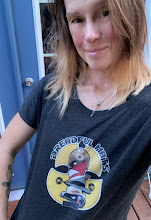This next part of the story from the little notebook focuses more on the mother's helper, who is finally named (though I am again using only the first initial). I feel for the mother's helper -- even though she may have been a royal pain in the butt and not well-suited to her job.
1978 continued
My mother’s helper [descended into/came downstairs to] the kitchen. Feet first. [Bead] sandals (in my day they were called [Roma] sandals and wound up the leg and tied), grey socks, Diane Keaton trousers, [Laura Ashley/Liberty] blouse, a five-year-old [Giddon’s] of London riding jacket, long straight brown hair, disgruntled face. My eyes took in the disgruntlement, my heart sank, my inner voice said, uh oh, what’s up with her? We’d been in London only two hours, ten minutes in the flat in Hampstead. Here we were, 20 feet from the beautiful heath, with the top floor of Victorian house to ourselves, a view of St. Paul’s dome and the radio tower to one side, trees and heath on the other. And already disgruntlement.
“Ha, ha, well, well,” I said.
“Let’s have tea, “ said T.
The mother’s helper asked where the nearest shops were. Just two minutes to little South End Green with [Rumfold’s] home made bread, delicatessen, patisserie. Everything, and I mean everything, three miles from the center of London.
“And a florist?” My mother’s helper asked.
“And a florist,” T. said.
And the mother’s helper said she’d be back in a moment. And she was, while our tea was still hot, with a bunch of flowers. For me? For T.?
“For my room, “ she announced. “There’s no color in it and I need color.” No color. [I understood] why she was grumpy. And T. hauled out a vase from the back of a cupboard for the flowers for A.’s room, which, alas, had no color.
“But there are flowers in the garden," T. said and pointed through the window to where her two and my one were fighting over the swing after only ten minutes.
Tricky to have a room, I thought.
And when she came down, T. made a fresh pot of tea.
We sat, T., A. and I and drank tea. I asking T. for news, gossip, anything; A. looking disgruntled still even though she now had color in her room.



